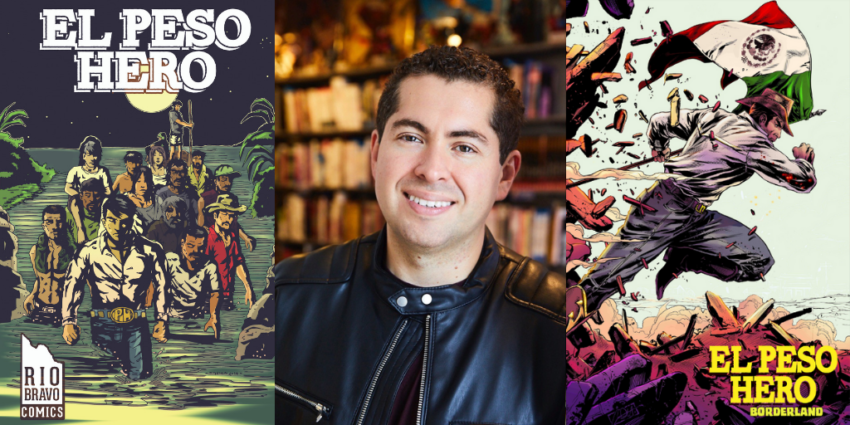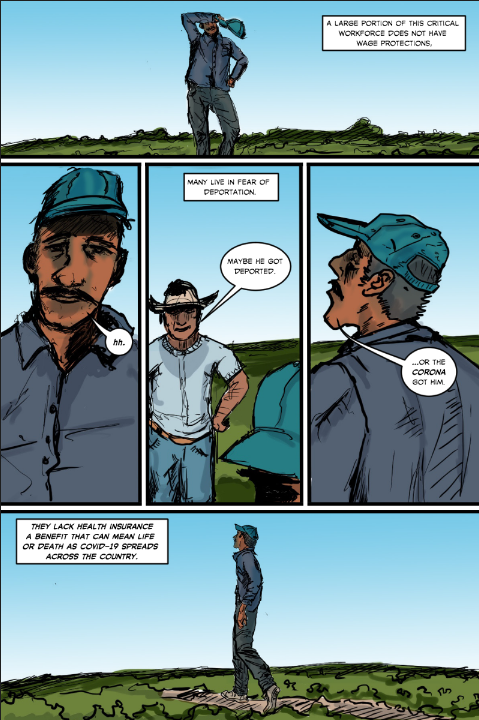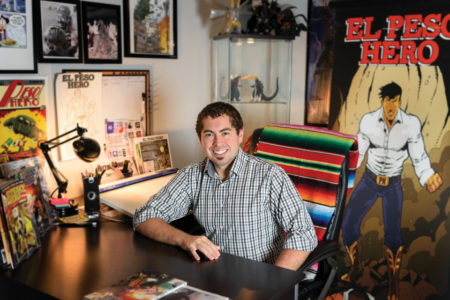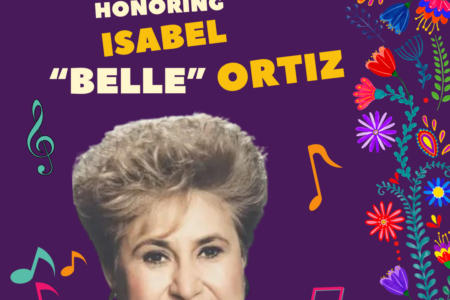
Share On Social!
To his students, he’s Mr. Rodríguez.
To his fans, he’s the creator and author of the comic book and graphic novel series El Peso Hero.
When he noticed a need for more Latino representation in comic books and literature, Héctor Rodríguez launched his long-time project as a web series in 2011. El Peso Hero is a Latino superhero who fights corruption, drug trafficking, immigration, and other real-life social and racial justice issues happening on the Texas/Mexico border.
Now almost 10 years later, Rodríguez has printed several comic books, produced a radio novella and short film, and is working on developing El Peso Hero into a Hollywood production.
Rodríguez first found inspiration for El Peso Hero during his childhood on the Texas/Mexico border.
Inspiration on the Border & Central Texas
Rodríguez is a native to Eagle Pass, Texas (95.1% Latino), which sits right on the Texas/Mexico border. He spent his childhood growing up there and around San Antonio and College Station.
 Surrounded by the unique Mexican American culture of the border region, Rodríguez craved stories that he could recognize himself in.
Surrounded by the unique Mexican American culture of the border region, Rodríguez craved stories that he could recognize himself in.
But they were few and far between.
“I had all these major influences growing up. Especially on the border, since it was very unique. It’s a very unique world. I had that hunger for more content that really spoke to me. But in reality, there has never been anything done within the border of Texas and Mexico,” Rodríguez said. “I draw a lot of my stories for El Peso Hero from the borderline.”
Rodríguez was drawn into the comic book world for its unique ability to immerse readers through relatable narrators.
“With the sequential medium, comic books are very open art. And it’s an art that anybody could create a story as well as put yourself in the perspective of a character through the sequential medium,” Rodríguez said.
His father introduced him to comics. He would bring home copies of Mad Magazine to his son after returning from tours in the Texas National Guard. His mother introduced him to Mexican culture through television.
“When watching luchadores in the old school Mexican movies, I was drawn to these greater than life characters that really spoke my language, had my culture. I really had that hunger for more of that content,” Rodríguez said.
When his family moved to College Station, Texas, Rodríguez felt the shock of no longer being in a majority Spanish-speaking, Mexican American community.
Adapting to the new culture was difficult, but he found relief through comics.
“The really cool thing about College Station was that there were comic bookstores. Each Friday, my dad would take us to buy comics after school,” Rodríguez said.
Ultimately, what led Rodríguez to create El Peso Hero was a conversation with his grandfather about Mexican drug cartels. He wondered if a superhero could stop the cartels, corruption, and crime.
“My gears started spinning, and I’m like, ‘Wow, it’d be pretty cool if there was a Mexican superhero, a norteño superhero.’ It’s something that is local, and something that is very unique to the north Mexican, Southwest culture. A hero that spoke to the history, the heritage, on that bridge between worlds,” Rodríguez said.
Thus, El Peso Hero began as Rodríguez’s side project.
A Full-Time Educator
While working away on El Peso on the side, Rodríguez also became a teacher.
“I’m currently a fifth-grade bilingual teacher in North Dallas, where I currently reside.
I’ve been in the education field for 10 years, specifically bilingual education within the urban areas of Dallas. It’s been an amazing experience,” Rodríguez said.
His father’s path as a teacher helped inspire him to go in that direction.
“My father is an experienced educator himself; he taught in the valley area. I kind of had the teaching bug early on, but you don’t realize you have it until later,” Rodríguez said.
But it was early on in his career as a teacher that Rodríguez knew he had to take El Peso Hero to the public.
Immigration Concerns Launch El Peso Hero

A sad moment with a student led Rodríguez to go all-in for El Peso Hero.
“In 2010, it was my first year as an educator. I had a situation where a student’s father was deported. I guess it caught me completely off guard,” Rodríguez said.
Rodríguez had been paying attention to the discussion surrounding immigration reform but didn’t expect it to impact him so closely.
“In the 2000s, I was noticing the need for immigration reform. And due to 9/11, all that took a backseat. But it’s something that was needed. And I did notice that it was it was affecting my classroom. And so I felt that was the time to launch El Peso Hero just for the representation for that story,” Rodríguez said.
In July 2011, Rodríguez launched El Peso Hero as a web comic.
El Peso Hero Sees Success
Soon after launching El Peso Hero online, Rodríguez gathered a devoted online following.
Every few weeks, he would post a new page and watch as his fans grew. At local comic conventions and artist networking events, he met fans who encouraged him to print El Peso Hero as a comic.
By the spring of 2012, Rodríguez had posted about 30 pages online. Those became the first print issue of El Peso Hero, which he self-published through his own personal press known as Rio Bravo Comics.
Rodríguez continued to see El Peso Hero grow in popularity as he sold out of print issues at local comic cons, selling over 5,000 copies in his first year. He often receives emails and cards from fans thanking him.
Now almost a decade later, he’s published 11 books and has three more on the way. He’s been featured in Mexican and American press. He’s also launched a radio novella, a short film, and is in production with Hollywood for a feature-length film (more on that later).
A lot of readers resonate with a character who fights real-life issues.
Throughout the books, El Peso Hero helps families across the border, saves people from immigration detention centers. He has super strength and bulletproof skin, but everything else is realistic. Rodríguez continues to find ways for El Peso Hero to help Latino communities on the border.

El Peso Hero even helped with COVID-19.
“Fans were asking, ‘What is El Peso Hero going to do with COVID?’ And I’m like, ‘Well, what do you mean?’ I mean, he cannot really punch a virus,” Rodríguez laughed.
Rodríguez instead took the opportunity to feature essential workers in the latest book, El Peso Hero: The Essentials.
“In this case, El Peso Hero takes a backseat in a supporting role to the real heroes, the essential workers, the farmworkers in the Rio Grande Valley. El Peso Hero is delivering face masks for farmworkers, who are the backbone of the American food supply,” Rodríguez said.
As long as there’s a need for Latino representation in comics, there’s always a story that El Peso Hero can tell.
Representation Issues
Rodríguez hopes that El Peso Hero can help fill the gap in children’s literature for Latino protagonists.

“There’s this interesting statistic. If you look at children’s literature specifically, about 92% of protagonists in children’s literature are Caucasian or European American. Second, it was like fantasy characters, like animals. And then it was African Americans and Latinos and Native Americans,” Rodríguez said.
In fact, a study by Cooperative Children’s Book Center in 2015 found that only 2.4% of characters in children’s book were Latino, compared to 12.5% non-human or fantasy characters.
Specifically in the comic book world, there’s a lack of Latino representation as well.
“There’s been 22 Marvel movies, but none of them included a Hispanic superhero. Sure, you had African American, but Latinos being the second largest minority in the United States and not being represented? Yeah, it’s kind of crazy to think,” Rodríguez said.
Current media portrayal of Latinos and immigrants is often harsh and one-sided.
Rodríguez hopes we’ll see more positive and diverse representation in the future, especially considering how the Latino youth population is growing.
“It’s just incredible. It’s huge, especially in Texas, where the student population is about 60% Latino or Hispanic and very soon Texas being a minority/majority state the next couple years,” Rodríguez said. “You see these stories and perspectives being needed in literature, even in comic books, too. And this is where for El Peso Hero, I see it being a very positive, influential force. A character that anybody could look up to, as well.”
Rodríguez sees the entertainment industry making slow changes with bringing Latino characters to children’s television.
“With Nickelodeon, we have The Casagrandes from The Loud House. And right now you have Santiago of the Seas. Within the animation realm, they’re noticing that some of these stories actually are great hits, where you have Elena of Avalor,” Rodríguez said.
Beyond Latino characters, Rodríguez hopes the industry gets more diverse behind the scenes, too.
“You have the diverse stories, but it’s also very important to have that creative, diverse force behind these stories. There are some opportunities there, of course, and it all it has to do with making sure there’s equal level playing field to bring in those different voices as directors, writers, screenwriters, actors, as well,” Rodríguez said.
The Future of El Peso Hero

As Rodríguez continues to teach his 5th graders virtually, he’ll also be working on the El Peso Hero movie and launching the next three books, finishing up the current story arc and starting a new one called Sicario War.
As he works on the film, Rodríguez is focused on having several Latino voices behind the scenes.
“We do currently have a project in development in Hollywood with Mucho Mas Media and Javier Chapa. He’s a producer from El Paso and a Tejano making inroads with diversity and inclusion in Hollywood. And within that film project we have Sean Tretta, he works for FX, the Mayans [M.C.]. We have some great producers, co-produced by Eli Roth too, so we have these really great talents involved in this project,” Rodríguez said.
Readers can keep up with Rodríguez and El Peso Hero on riobravocomics.com. You can download the latest book, El Peso Hero: The Essentials, for free.
How Teachers Can Focus on Diverse Representation
Rodríguez hopes that other educators will make an effort to include diverse perspectives in the material they teach.
“It’s about finding the right literature, finding that representation, and bringing these different worlds to different students and classrooms, regardless of socioeconomic status or location. It’s very important to have a rich, diverse library with different perspectives, different stories, where anybody can pick up a book and see themselves through those characters and see themselves through the stories,” Rodríguez said.
Having a cultural connection to a story can be very impactful for students, according to Rodríguez.
“It’s very powerful. Having that sense of ownership in connection with a story, seeing their stories being told, it’s very important,” Rodríguez said. “Regardless if it’s a comic book or graphic novel, it’s the importance and the need for being surrounded by rich, multicultural stories.”
Editor’s Note: Bottom image of Rodríguez is from the University of North Texas.
By The Numbers
44
million
immigrants live in the United States
This success story was produced by Salud America! with support from the Robert Wood Johnson Foundation.
The stories are intended for educational and informative purposes. References to specific policymakers, individuals, schools, policies, or companies have been included solely to advance these purposes and do not constitute an endorsement, sponsorship, or recommendation. Stories are based on and told by real community members and are the opinions and views of the individuals whose stories are told. Organization and activities described were not supported by Salud America! or the Robert Wood Johnson Foundation and do not necessarily represent the views of Salud America! or the Robert Wood Johnson Foundation.



